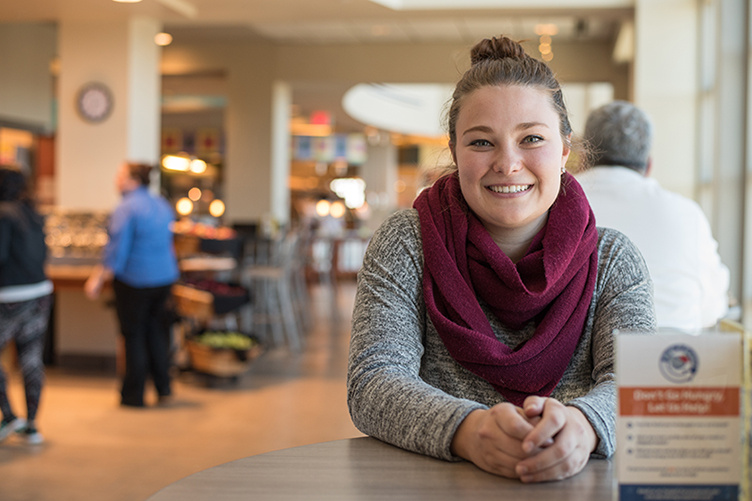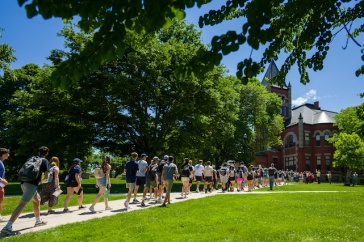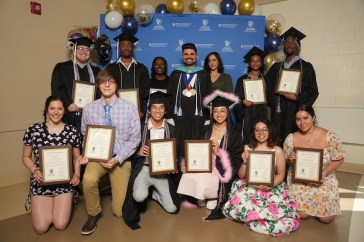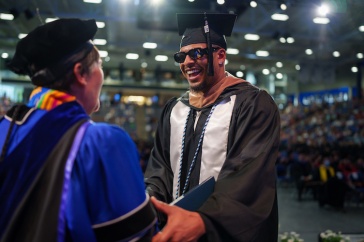
Alana Davidson’s emails end with this quote: “For now I ask no more than the justice of eating.”
It’s from Pablo Neruda’s “The Great Tablecloth,” a poem that describes the pain and inequity of hunger. They’re fitting words for the UNH nutrition major and Hamel Scholar who started Swipe It Forward, a program that provides free meals for students who can’t always afford to eat.
But for Davidson the road to fighting hunger took a couple turns.
“I actually grew up wanting to be a baker,” she says with a light laugh. “I grew up in the kitchen cooking and baking with my dad. But I decided I didn’t want to wake up at three in the morning to make scones.”
Davidson arrived on campus in 2013 interested in sports nutrition, not food insecurity, and she remembers feeling initially overwhelmed by college life. But in four years, she has gone from a nervous first-year student to a self-assured graduate with a clear view of her future. It’s a path that illustrates the transformative power of the university’s singular faculty and undergraduate research opportunities.
Alana's Advice to Students:

"Reach out to faculty at UNH. Going to office hours and asking questions when I didn’t understand something was instrumental to my success. Don’t be afraid to get to know your professors. That has had a lot of impact on my life."
It all began with the College Health and Nutritional Assessment Survey, an ongoing project that’s been collecting data on the health of UNH students for 10 years. In her first year, Davidson got involved helping with bone health screenings. Then, in her sophomore year, she was given the chance to design a research project based on any aspect of student nutrition and health.
It was the perfect opportunity to explore a problem she encountered as a volunteer at a mental health center in her home state of Connecticut delivering locally grown food to people on public assistance: food insecurity.
“That was my first real experience with hunger,” she says. “The USDA does research on food insecurity at the household and childhood level, but they don’t look at college students, so we’re not sure how many college students might be going hungry.”
Davidson's project led her to conduct a campus-wide survey, supported by a grant from UNH's Hamel Center for Undergraduate Research, during her junior year. The results were surprising: Of the nearly 1,000 students who responded, 25 percent reported being food insecure, meaning they were without reliable access to enough affordable, nutritious food.
These students, Davidson says, are more likely to experience headaches, lethargy and an inability to concentrate — all due to a lack of proper nutrition.
“I want everyone to have the access and opportunity to eat the fresh fruits and vegetables I had when I was growing up,” she says, when asked about what drives her. “We produce enough food in this country to feed everyone, so it’s not a production problem. The issue is, ‘Why are some people denied access to this food?’ I look at it as a human rights issue.”
Armed with the survey results, Davidson took action and, with the help of UNH faculty and administrators, created Swipe It Forward. It was an experience, she says, that “changed everything.” Now, students who qualify for the program can use their meal cards or finger scan — just like their food-secure peers — to access meal credits that have been donated to the "swipe bank."
“I remember sitting in the first task force meeting with deans and other leadership and thinking, ‘How did I end up here?’,” she says. “It really showed me the power of advocacy and how we really have an obligation to speak up and help others.”
This summer, Davidson is volunteering at End Hunger Connecticut, where she's helping administer a federal program that feeds low-income children when they’re not in school.
Then she'll be off to Tufts University, where she'll work toward a Master of Science in food policy and applied nutrition. She'll also speak at the American Public Health Association's annual conference in November. Davidson hopes one day to drive policy changes that impact food insecurity at the college level. Improved nutrition, she says, will lead to better grades, fewer dropouts and brighter futures.
After speaking with the newly minted graduate who is already emerging as an authority on college food insecurity, one can imagine a time when everyone recognizes the imperative of Neruda’s entreaties:
Let us sit down soon to eat
with all those who haven’t eaten
Eating alone is a disappointment,
but not eating matters more
Learn more about how UNH nutrition majors are applying their research and making a positive impact.
-
Written By:
Sarah Schaier | College of Life Sciences and Agriculture
















































